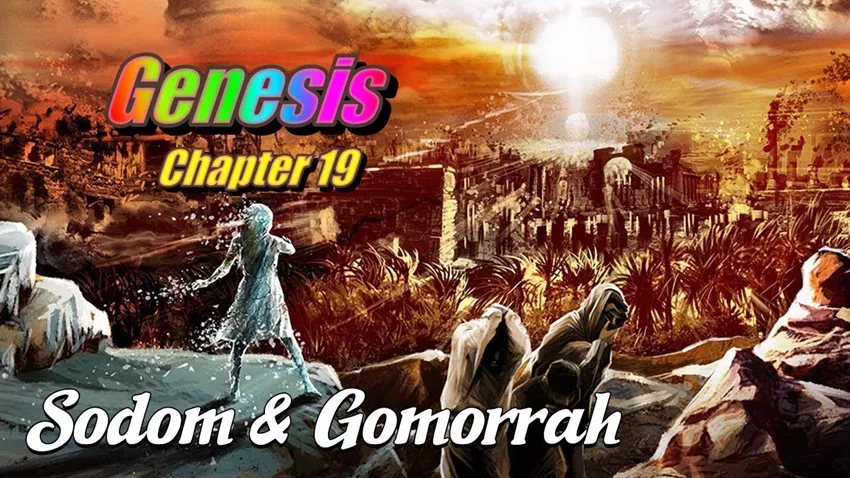Genesis Chapter 19 Summary
Genesis Chapter 19 recounts the events surrounding the destruction of Sodom and Gomorrah. The chapter begins with two angels arriving in Sodom, where they are greeted by Lot. Lot offers them hospitality, but the men of the city surround his house, demanding to abuse the visitors. Lot tries to protect his guests by offering his daughters instead, but the crowd persists. The angels then reveal their divine purpose and instruct Lot and his family to flee the city. As they escape, Lot’s wife looks back and turns into a pillar of salt. The chapter concludes with the destruction of Sodom and Gomorrah by fire and brimstone, highlighting themes of divine judgment and mercy.
Bible Genesis Chapter 19
Welcome to read Genesis Chapter 19. Here is the list of Genesis Chapter 19:
What Does Genesis Chapter 19 Teach Us?
Genesis Chapter 19 is a powerful narrative that offers profound insights into divine justice, mercy, and the consequences of sin. This chapter, which recounts the destruction of Sodom and Gomorrah, provides critical lessons relevant to both historical and contemporary contexts.
The Nature of Divine Judgment
1. The Reality of Divine Judgment
Genesis 19 vividly portrays the reality of divine judgment. The chapter details the wickedness of Sodom and Gomorrah, which had reached such an extreme that God decided to bring judgment upon these cities. The actions of the city’s inhabitants, including their attempt to assault Lot’s guests, demonstrate their moral depravity and disregard for righteousness.
The destruction of Sodom and Gomorrah serves as a dramatic illustration of how seriously God takes sin and unrighteousness. It reminds readers that divine judgment is not arbitrary but a response to persistent and egregious wrongdoing. This teaches us that there are serious consequences for sin and that God’s justice is both real and inevitable.
2. The Consequence of Ignoring Warnings
In the narrative, Lot is warned by the angels to flee the city. His initial reluctance and the delay in leaving reflect the danger of ignoring divine warnings. The urgency of the angels’ message highlights the importance of heeding God’s guidance and acting promptly to avoid judgment.
Lot’s hesitation and the subsequent destruction of his home underscore the importance of responding to divine warnings with urgency and obedience. This teaches us that delaying or dismissing God’s warnings can lead to severe consequences, reinforcing the need for immediate and faithful action in the face of divine instructions.
The Mercy of God
1. The Role of Intercession
Before the destruction, Abraham had interceded for Sodom, pleading with God to spare the city if a certain number of righteous people could be found. Although the number of righteous was insufficient to save the city, Abraham’s intercession shows God’s willingness to listen to prayers on behalf of others.
This aspect of the chapter emphasizes the power and importance of intercessory prayer. It teaches believers that God values their prayers and is willing to consider their pleas for mercy on behalf of others. The narrative encourages believers to engage in prayer and intercession for those who may be in need of divine grace.
2. The Salvation of the Righteous
Lot’s rescue from Sodom illustrates God’s mercy towards the righteous even in the midst of judgment. Although the cities are destroyed, Lot and his family are saved due to Lot’s righteousness and the angels’ intervention. This act of deliverance shows that God’s mercy extends to those who are faithful and righteous, even when judgment falls upon the wicked.
This teaches that God is not only just but also merciful, providing a way of escape for those who follow Him. It highlights that while God’s judgment is certain, His mercy is also abundantly available to those who seek Him and live righteously.
The Consequences of Disobedience
1. The Fate of Lot’s Wife
Lot’s wife turns into a pillar of salt after looking back at the burning city. Her act of disobedience, despite the clear instruction not to look back, demonstrates the peril of clinging to the past or disobeying divine commands. This incident underscores the importance of obedience and the dangers of looking back or longing for what God has called us to leave behind.
Her fate serves as a stark reminder of the consequences of failing to fully comply with God’s commands. It teaches that partial obedience is not sufficient and that God’s instructions should be followed completely to avoid negative outcomes.
2. The Impact of Moral Decay
The chapter also reflects the broader consequences of moral decay and societal corruption. The extreme wickedness of Sodom and Gomorrah led to their complete destruction, emphasizing the impact of widespread sin and the need for moral and ethical righteousness within societies.
The narrative warns against the dangers of moral decline and serves as a call to uphold righteousness and integrity. It encourages individuals and communities to strive for moral purity and to resist the influence of corrupt practices.
Conclusion
Genesis Chapter 19 provides a compelling account of divine judgment and mercy. It teaches the reality and seriousness of God’s judgment, the importance of heeding divine warnings, and the power of intercessory prayer. Additionally, it highlights God’s mercy towards the righteous and the consequences of disobedience and moral decay. These lessons are not only relevant to understanding the historical context but also offer timeless guidance for living a life of faith and obedience.


